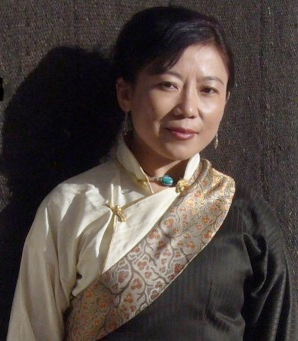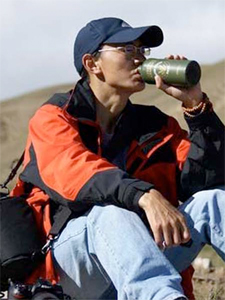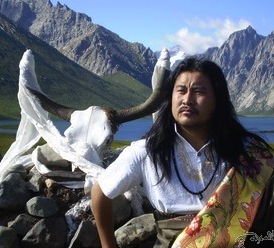Dechen Pemba
As a place to meet, share and exchange, the Tibetan blogosphere has created opportunities for Tibetan netizens that would be unimaginable in the offline world. Keeping in mind the state of internet censorship in the People’s Republic of China today, these new spaces can be seen as new outlets but also as new areas involving personal risk. Tibetan cyberspace has opened up a new opportunity for expression, which has also brought new risks to this community.
There are several blog-hosting sites, both Tibetan and Chinese, that are favoured by Tibetans in the People’s Republic of China (PRC) today. One of the of the most popular Chinese language sites is called Tibetan Culture Net or simply TibetCul. TibetCul was started by two brothers, Wangchuk Tseten and Tsewang Norbu, and their head office is in Lanzhou, capital of Gansu Province. According to Alexa, the web Information Company, TibetCul receives over 400,000 hits every month. TibetCul is primarily a news and blog-hosting site but there are many different sections on the site related to Tibetan music, literature, films and travel. There is a BBS forum (bulletin board) and there is even a section dedicated to “overseas Tibetans”.
For all Tibet related news, blogs and cultural activities, TibetCul is an invaluable resource and source of information. Many posts translated into English by High Peaks Pure Earth come from TibetCul, such as the translation of the popular Tibetan hip-hop song “New Generation” by Green Dragon that was first featured on the group’s TibetCul blog in February 2010 in which a gang of Amdo rappers boldly proclaimed:
“The new generation has a resource called youth
The new generation has a pride called confidence
The new generation has an appearance called playfulness
The new generation has a temptation called freedom”
In a similar surge of pride in Tibetan identity that featured on Tibetan blogs post-2008, TibetCul blogs featured many poems and prose articles with the title “I Am Tibetan” and new posts are being written even today.
Heated discussions and debate take place on TibetCul every day about all matters of concern to Tibetans. One major example would be the online vilification of well-known Tibetan singer Lobsang Dondrup following photos posted on blogs of him and his wife both wearing fur at their wedding ceremony in early 2009. The photos were quickly re-posted across many blogs, incurring the wrath of angry Tibetan netizens and comments criticising the couple flooded the internet forums both in Tibetan and Chinese. This must all be seen in context, in 2006, after the Dalai Lama’s injunction against the wearing of animal fur, a wave of fur burning protests took place in Amdo and Kham. Hence the netizens anger and loathing for the couple. Shortly after, Lobsang Dondrup posted an apology online through his friend’s TibetCul blog.
The above observations on TibetCul demonstrate the nature of cyberspace in the ability to bring people together in discussion and debate and also the ability for the online content to transcend national borders, “New Generation” has gone on to become a popular song amongst Tibetans all over the world and the “I Am Tibetan” poetry and spirit has sparked Tibetan exile groups to hold events to amplify voices from Tibet.
In a paper from 2004, Tibetan scholar Tashi Rabgey referred to the Lhasa tradition of the Sweet Tea House: “Throughout the 1980s, sweet tea houses had served as important gathering places for Tibetans to exchange news, air opinions and discuss ideas.” However, “with the tightening of political controls in the early 1990s […] this unusual space of lively, open debate was brought to an end through constant surveillance.” The new virtual Sweet Tea House contains Tibetans who are literate in many languages but mainly in Tibetan, Chinese and English and Tibetans from Central Tibet, Kham, Amdo, India, USA and beyond, all in contact and dialogue.
Whilst the potential for contact and dialogue in the Tibetan cyberspace is great, control of the internet and the politicisation of the blog content poses difficulties and risks. Monitoring Tibetan blogs reveals that throughout the year, at times deemed “sensitive” by the Chinese government, Tibetan blog-hosting sites will suddenly with no explanation or prior warning either be taken offline or be offline “for maintenance”. This happens typically for Tibetan blogs around the time of March 10, the anniversary of the Tibetan uprising against Chinese rule in 1959. See this link for an example of TibetCul suddenly disappearing offline and this link for Tibetan-language blogs being taken offline.
Similarly, individual bloggers are in danger of being targeted by the state for blog content deemed to be dubious. The most famous example is the Tibetan poet, writer and blogger, Woeser, who was writing two blogs, one on TibetCul and another on a Chinese blog hosting site but both of which were suddenly shut down on 28 July 2006. Woeser then had no choice but to start a new blog on a server hosted outside the PRC but has since faced a new set of problems such as server cyber-attacks by Chinese nationalists, both to her blogs and her Skype accounts.
Tibetan language blog-hosting sites have been even more vulnerable than TibetCul and two previously very popular sites have been inaccessible since 2009, http://tibettl.com/ and http://www.tibetabc.cn/ The latter was particularly a great loss as prominent singer and blogger Jamyang Kyi’s blog had previously been hosted by Tibetabc but she seems to have stopped blogging altogether since the site was closed down.
Two recent examples of individuals using blogs and the internet for purposes of social justice have been Dolkar Tso and Shogdung. Dolkar Tso, the wife of environmentalist Karma Samdrup, was blogging almost daily in June and July 2010, documenting the events of her husband’s trial and expressing her personal feelings about the injustice of his sentencing to 15 years in prison. Amazingly, Dolkar Tso persistently kept blogging on Chinese blog-hosting site Sohu and, at the last count, is on her fifth blog as the others kept being shut down rapidly.
Tagyal, a writer and intellectual who used the pen name Shogdung meaning “Morning Conch”, openly spoke out in April 2010 following the devastating earthquake that hit Yushu. He, along with several other intellectuals, published an open letter on Tibetan language blog-hosting site http://www.sangdhor.com in which they expressed condolences and at the same time were critical of the Chinese government in their handling of the earthquake relief efforts. Following this open letter, Shogdung was arrested and is still facing trial. Following Shogdung’s arrest, the site Sangdhor was taken offline for several months and has only recently come back online.
The last two examples of Dolkar Tso and Shogdung illustrate the importance of Tibetan blogs as sources of information and as ways to highlight injustice but evidently this comes at a great price for the individuals involved. The virtual Sweet Tea House is ultimately as vulnerable as the Lhasa tea houses of the 1990s were and is likely to remain so as long as Tibetan blogs remain behind the Great Firewall.
______________________________
Dechen Pemba is a UK born Tibetan, based in London. She is the editor of the website High Peaks Pure Earth, which provides insightful commentary on Tibet related news and issues and translations from writings in Tibetan and Chinese posted blogs.
Download bloggers’ profiles here.


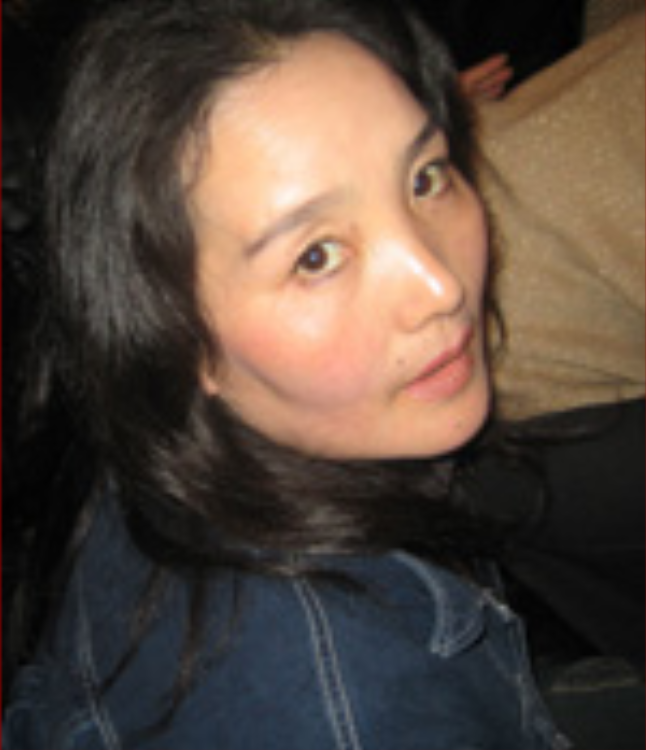
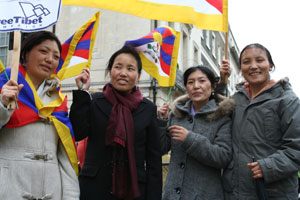 [L-R Gyaltsen Drolkar, Phuntsog Nyidrol, Ngawang Sangdrol and Namdrol Lhamo in London. Photo Free Tibet http://www.freetibet.org]
[L-R Gyaltsen Drolkar, Phuntsog Nyidrol, Ngawang Sangdrol and Namdrol Lhamo in London. Photo Free Tibet http://www.freetibet.org]